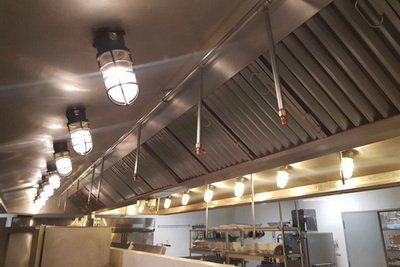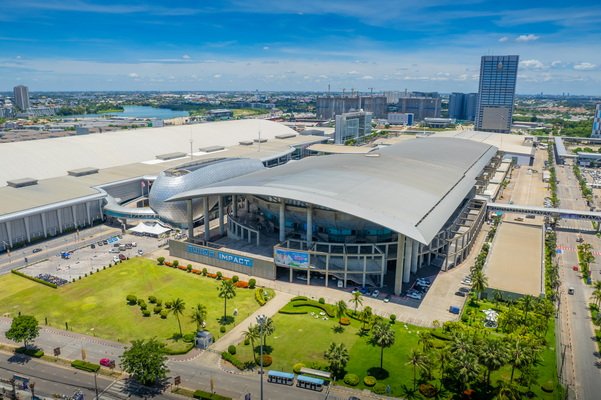อิมแพ็ค มุ่งมั่นดำเนินงานตามแนวทางมาตรฐานการบริหารการจัดงานอย่างยั่งยืนประเทศไทย หลังพัฒนาโครงสร้างพื้นฐานด้านการใช้พลังงานไฟฟ้าพลังแสงอาทิตย์ พร้อมเผยผลประหยัดพลังงานสะสม 8 เดือนแรก อยู่ที่ 6 แสนกิโลวัตต์ ลดค่าใช้จ่ายได้เกือบ 3 ล้านบาท
นางสาวจินตนา พงษ์ภักดี ผู้อำนวยการสำนักงานฝ่ายสื่อสารองค์กร บริษัท อิมแพ็ค เอ็กซิบิชั่น แมเนจเม้นท์ จำกัด ผู้บริหารศูนย์แสดงสินค้าและการประชุม อิมแพ็ค เมืองทองธานี เปิดเผยถึงนโยบายของ อิมแพ็ค ในฐานะผู้ดำเนินธุรกิจไมซ์ (MICE) ได้ให้ความสำคัญและมุ่งมั่นปฏิบัติตามแนวทางมาตรฐานการบริหารการจัดงานอย่างยั่งยืนประเทศไทย หรือ Thailand Sustainable Event Management Standard (TSEMS) โดยส่งเสริมให้ผู้บริหารและพนักงานตระหนักถึงแนวทางการดำเนินงานตามมาตรฐาน TSEMS อย่างเป็นรูปธรรม ในทุกปีมีการนำเสนอโครงการพัฒนาเพื่อความยั่งยืนในด้านต่างๆ

พร้อมกำหนดโครงการหลักครอบคลุมในทุกด้านทั้งสังคม เศรษฐกิจ และสิ่งแวดล้อม อาทิ โครงการพลังงานสะอาด, โครงการสถานีชาร์จรถไฟฟ้า, โครงการคัดแยกขยะก่อนทิ้ง, โครงการลดการใช้พลาสติก, โครงการจัดการน้ำเสียภายในพื้นที่เมืองทองธานี, โครงการจัดซื้อสินค้าที่เป็นมิตรต่อสิ่งแวดล้อม, โครงการขยะเป็นศูนย์ (Zero Waste), โครงการ อิมแพ็ค ฟาร์ม, โครงการสนับสนุนการจ้างงานคนในชุมชน นักเรียน นักศึกษา, โครงการกล้า MICE, โครงการอิมแพ็ค ปันน้ำใจมอบรักสู่สังคม, โครงการสุนัขชุมชนเมืองทองธานี, โครงการจักรยานสายตรวจชุมชนเมืองทองธานี, โครงการ Hotel Sustainable ของโรงแรมในเครือ (โนโวเทล กรุงเทพ อิมแพ็ค และ ไอบิส กรุงเทพ อิมแพ็ค) เป็นต้น
“ในแต่ละปีนอกจากการนำเสนอโครงการใหม่ๆ ยังได้มีการติดตามผลสำเร็จของโครงการที่ดำเนินงานมาแล้วอย่างต่อเนื่อง ซึ่งเป็นที่พอใจอย่างมาก ในหลายโครงการสามารถลดผลกระทบด้านสิ่งแวดล้อมและยังส่งผลดีทางด้านสังคม เศรษฐกิจด้วย ยกตัวอย่าง โครงการความมั่นคงทางพลังงาน โครงการลดการลดใช้พลังงาน ที่ทีมวิศวกร อิมแพ็ค ได้ดำเนินการติดตั้งโซลาร์เซลล์ รูปแบบ Solar Rooftop เปลี่ยนพลังงานแสงอาทิตย์จากธรรมชาติมาอยู่ในรูปของพลังงานไฟฟ้า ซึ่งทำให้ประหยัดค่าไฟฟ้า อีกทั้งลดปัญหาก๊าซเรือนกระจก เพราะระบบเซลล์แสงอาทิตย์ ถือเป็นพลังงานทางเลือก พลังงานสะอาด ส่งเสริมความยั่งยืน”

นายวิชัย บรรพบุรุษ ผู้อำนวยการฝ่ายบริหารอาคาร กล่าวเสริมถึงโครงการโซลาร์เซลล์ หรือ Solar Rooftop มีการติดตั้งใน 3 พื้นที่หลักของอิมแพ็ค ได้แก่ 1.) หลังคาของอาคารชาเลนเจอร์ มีขนาดกำลังผลิตไฟฟ้าอยู่ที่ 593.64 กิโลวัตต์ 2.) หลังคาอาคารจอดรถ P2 มีขนาดกำลังผลิตไฟฟ้าอยู่ที่ 316.20 กิโลวัตต์ 3.) หลังคาอาคารจอดรถ P.3 มีขนาดกำลังผลิตไฟฟ้าอยู่ที่ 153 กิโลวัตต์ ซึ่งในแต่ละปีทั้ง 3 อาคารมีปริมาณการผลิตไฟฟ้ารวมอยู่ราว 1.1 ล้านกิโลวัตต์ และต้องการปริมาณผลิตไฟฟ้าเพิ่มขึ้น ในเร็วๆ นี้ ยังมีแผนติดตั้ง โซลาร์เซลล์ บนหลังคาอาคารชาเลนเจอร์อีกฝั่งเพิ่มด้วย
โครงการลดการใช้พลังงาน อิมแพ็ค ไม่เพียงปลูกฝังค่านิยมให้กับพนักงานในองค์กร แต่ยังทำความเข้าใจและเชิญชวนลูกค้าผู้จัดงาน ตระหนักและมีส่วนร่วมในการลดการใช้พลังงาน เพื่อลดผลกระทบจากภาวะโลกร้อน พร้อมตั้งเป้าลดการใช้พลังงานในพื้นที่จัดแสดงงาน โดยปี 2567 นี้ อิมแพ็ค ตั้งเป้าลดการใช้พลังงานในพื้นที่จัดแสดงงานอยู่ที่ 3% (อ้างอิงข้อมูลปี 2566 มาเป็นฐานเปรียบเทียบ) และจากตัวเลขสรุป 8 เดือนแรก (มกราคม-สิงหาคม 2567) อิมแพ็ค ลดการใช้พลังงานไฟฟ้าได้ถึง 606,376 กิโลวัตต์/ชั่วโมง คิดเป็นอัตราค่าใช้จ่ายที่ประหยัดได้ราว 2,831,779 บาท สามารถช่วยลดก๊าซเรือนกระจก 340,177 กิโลคาร์บอนไดออกไซด์ (kgCO2e) ซึ่งเทียบเท่าการลดการใช้พลังงานบ้าน 2 ชั้น ขนาด 16 ตารางวา จำนวน 1,810 หลังคาเรือน ความสำเร็จครั้งนี้เป็นผลมาจากการติดตั้งโซลาร์เซลล์ การเปลี่ยนหลอดไฟเดิมเป็นหลอดไฟ LED ตามอาคารและห้องจัดงานต่างๆ การควบคุมการทำงานของระบบปรับอากาศ (BBP) การเปลี่ยนม่านอากาศ หรือ Air Curtain รวมถึงการปรับใช้อุณหภูมิพื้นที่จัดงานที่เหมาะสม

IMPACT is dedicated to adhering to the Thailand Sustainable Event Management Standard, achieving impressive energy savings of 600,000 kilowatt-hours in the first 8 months of the year, which translates to a cost reduction of nearly 3 million baht.
Ms. Jintana Phongpakdee, Director of Corporate Communications, IMPACT Exhibition Management Co., Ltd., the operator of IMPACT Exhibition and Convention Center, Muang Thong Thani, emphasized the company’s strong commitment to the Thailand Sustainable Event Management Standard (TSEMS). As a key player in the MICE industry, IMPACT prioritizes raising awareness among executives and employees about these guidelines in a concrete manner. As a result, sustainable development projects in various aspects are proposed each year.
IMPACT has initiated a variety of projects that address social, economic, and environmental concerns, such as Clean Energy, Electric Vehicle Charging Station, Waste Separation, Plastic Use Reduction, Wastewater Management within Muang Thong Thani, Green Procurement, Zero Waste, IMPACT Farm, Employment Support Project for Students and People in the Community, Kla MICE, IMPACT Touching Hearts Sharing Love, Muang Thong Thani’s Dog Community, Muang Thong Thani Community Bike Patrol, and Hotel Sustainable Campaign in IMPACT hotels (Novotel Bangkok IMPACT and ibis Bangkok IMPACT).
“In addition to proposing new projects each year, we actively monitor the success of our existing projects, many of which have yielded highly satisfactory results. These projects not only reduce environmental impacts but also provide significant social and economic benefits, including the Energy Security Policy, and Energy Conservation Project where IMPACT’s engineering team installed solar rooftops to transform sunlight into electrical energy, which helps save electricity costs and reduce greenhouse gas emissions. The solar panel system is also considered a clean and sustainable energy alternative.”
Mr. Wichai Bunpaburut, Director of Facility Management, noted that IMPACT had solar rooftops installed in 3 main areas: 1.) The roof of the IMPACT Challenger building with a generation capacity of 593.64 kilowatts 2.) The roof of the P2 parking garage with a generation capacity of 316.20 kilowatts 3.) The roof of the P3 parking garage with a generation capacity of 153 kilowatts. Together, these installations generate a total electricity generation of approximately 1.1 kilowatts each year. To further increase electricity generation, a plan was made to install additional solar panels on the other side of the IMPACT Challenger building’s roof.
As part of the Energy Conservation Project, IMPACT has instilled values of energy consumption mindfulness among employees and actively encouraged customers to participate in conservation efforts to help reduce the impact of global warming. IMPACT also set a goal to reduce energy consumption in the exhibition area. In 2024, IMPACT set a target to achieve energy conservation in the exhibition area by 3% (compared to the data in 2023). According to the report of the first 8 months (January-August 2024), IMPACT managed to reduce the energy consumption in the exhibition area by 606,376 kilowatt-hours, resulting in cost savings of 2,831,779 baht. This also led to a reduction of greenhouse gas emissions by 340,177 kg CO2e, which is equivalent to the energy consumption of 1,810 two-story houses, each occupying an area of 16 square wa. This accomplishment results from the installation of solar panels, the use of LED light bulbs in various buildings and function rooms, the implementation of air conditioning system control (BBP), the replacement of air curtains, and the adjustment of optimal temperature settings for different event venues.








